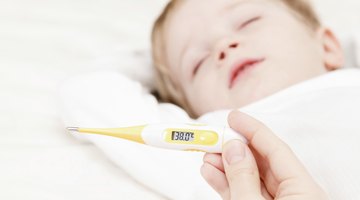What to Do With an Infant With Skin Hot to the Touch?
When your infant's skin feels hot to the touch, something is wrong.
Unlike older children, you can't ask a baby to hold a thermometer under his tongue for 20 seconds and then describe in words he feels. You can still take his temperature, access his symptoms and provide proper care.
Causes
A fever caused by illness is the most common reason your infant would feel hot to the touch; however, your baby may also run a fever after immunizations, during teething or when she is dressed too warmly.
If your teething baby has a fever above 99 degrees F, illness is likely the cause.
Dressing your infant too warmly is dangerous because your baby can't regulate her own body temperature well. Additionally, dressing your baby too warmly may cause sudden infant death syndrome, the American Academy of Pediatrics says.
Rectal Temperatures

Differences Between Taking a Child's Temperature Orally and Under the Arm
Learn More
Rectal thermometers give an accurate reading of your baby's temperature and are the only thermometers recommended for infants younger than three months. A normal rectal temperature is 99.6 degrees F, and a fever is a rectal temperature above 100.4 degrees, cites FamilyDoctor.org. To take the temperature rectally, place your baby on his back and pull his legs toward his chest, as in a diaper change. Stick a lubricated thermometer about 1/2 to 1 inch into the anal opening. If you feel any resistance, stop.
Hold the thermometer in place between your fingers and cup his bottom with your hand until the thermometer beeps. Gently remove the thermometer in a fluid motion.
Oral and Tympanic Temperatures
If your baby is at least 3 months old, you can take her oral temperature with a digital thermometer in the mouth, or you can take her tympanic temperature with an electronic ear thermometer.
An ear thermometer rests inside the ear opening but should not touch the eardrum. A normal oral or tympanic temperature is 98.6 degrees F. Most doctors define a fever as an oral or tympanic temperature above 99.5 degrees F, says FamilyDoctor.org.
Treatment

How to Tell if a Baby Is Cold
Learn More
Fever reducers, such as acetaminophen or ibuprofen, are safe for an infant older than 2 months. Follow the package directions for dosing. The correct dosage depends on your baby's weight and age.
Do not give an infant under 2 months old any fever reducer without your doctor's permission. Never give an infant aspirin, which may cause the fatal disease Reye's syndrome, warns KidsHealth.org.
Keep your baby hydrated with plenty of fluids. Give your infant a sponge bath in lukewarm water, dress him in lightweight clothing, and set your home's thermostat between 70 and 74 degrees F.
Warnings
The severity of the fever depends on your infant's age and the symptoms that accompany the fever. Any fever in an infant younger than 3 months old is dangerous and cause to call your doctor. For an infant between 3 months and 6 months, call your doctor if the baby's temperature reaches 101 degrees F or higher.
For an infant 6 months or older, call your doctor if a fever of 102 to 102.9 degrees F lasts longer than two days, or if the fever reaches 103 degrees F or higher. FamilyDoctor.org says to call your doctor if any of the following symptoms are present with a fever: dry mouth, pulling at the ears, high-pitched crying, whimpering, irritability, no appetite, pale appearance, seizures, severe headache, skin rash, sore or swollen joints, sore throat, stiff neck, stomach pain, swelling of the soft spot on your infant’s head, unresponsiveness, limpness, wheezing or problems breathing.











